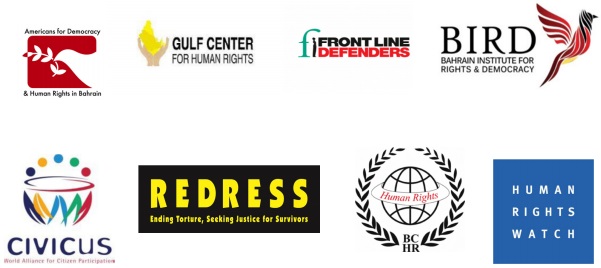On 5 September 2014, a coalition of eight human rights organizations submitted letters to UN Ambassadors from 47 countries ahead of the 27th session of the Human Rights Council. The letters requested the UN delegations to call for the release of all political prisoners in the Kingdom of Bahrain, including Abdulhadi al-Khawaja and the rest of the Bahrain 13. The 47 countries addressed in these letters had previously signed a joint statement at the 26th session of the Human Rights Council this past June, expressing serious concern over the human rights situation in Bahrain.
Please continue reading for the full text of the letter.
September 05, 2014
Dear Ambassador,
The undersigned representatives of international and regional human rights organisations write to urge your delegation to repeat your June call for the release political prisoners in Bahrain, who have been imprisoned solely for exercising their human rights.
We appreciate the public comments earlier this week by State Department Spokesperson Jen Psaki, which noted that the government of Bahrain needs to “protect universal rights of freedom of expression and assembly… do more to meet its own commitments to reform,” But in light of the imminent risk to the life of Abdulhadi al-Khawaja, a prominent rights activist, who began a hunger strike on August 24 in protest of his unlawful detention, we urge you to go further and call for the immediate release of Abdulhadi al-Khawaja and 12 other high-profile dissidents in Bahrain who were convicted in the same trial for their peaceful political activism In June 2014.
As you will recall, the United States signed a joint statement at the 26th session of the United Nations Human Rights Council that called on Bahrain to “release all persons imprisoned solely for exercising human rights, including human rights defenders, some of whom have been identified as arbitrarily detained according to the UN Working Group on Arbitrary Detention. This description clearly encompasses the 13 high-profile activists, notably Abdulhadi al-Khawaja, who was the only Bahraini prisoner at that time whose detention the Working Group had addressed and classified as arbitrary on July 13, 2012.
As you may know, in June 2011, a military court convicted 21 leading activists on charges that included broadcasting “false and tendentious news and rumors,” promoting the replacement of Bahrain’s monarchy with a republican form of government and “inciting” people to engage in demonstrations and marches. The 14 defendants who were in custody – seven were convicted in absentia – appealed the military court verdict. During subsequent proceedings in the Supreme Appellate Court, civilian prosecutors purportedly withdrew charges for “crimes linked with freedom of expression.” In reality, and based on analysis of court documents, prosecutors continued to pursue charges based upon the defendants’ advocating the establishment of a republican form of government in Bahrain and related activities.
For example, the court found that Abdulhadi al-Khawaja and others had “propogate[d] the overthrow of the state’s political order.” It found that members of the group “worked assiduously to frustrate” a “national dialogue,” choosing instead to “advocate the declaration of a republic in the country” and that members of the group attended various protests. The court concluded only that the defendants had engaged in a variety of acts of political protest—acts that are protected under international and Bahraini law. Despite this, the court ruled that all defendants were guilty of terrorism (except for one defendant whom the military court had acquitted of this charge) and affirmed the prison terms that the military courts had pronounced, including 3 life sentences, one of which was for Abdulhadi al- Khawaja.
Abdulhadi al-Khawaja’s hunger strike is in protest at the unlawfulness of his detention and the detention of others, whose only “crime” has been to call for political reform using recognized and protected tools of peaceful political protest. As you know, his daughter, Maryam al-Khawaja was arrested as she returned to Bahrain to visit her father.
We welcome and appreciate the Obama administration’s willingness to sign on to the June 2014 HRC statement, and now, urge you to repeat that call explicitly. Doing so will further clarify the United States’ commitment to human rights and reform in Bahrain, both of which will be further jeopardised in the event of the death of an innocent and courageous human rights activist.
Sincerely,
• Americans for Human Rights and Democracy in Bahrain
• Bahrain Center for Human Rights
• Bahrain Institute for Rights and Democracy
• Civicus
• Frontline Defenders
• Gulf Center for Human Rights
• Human Rights Watch
• Redress
A pdf version of this letter is available here.





